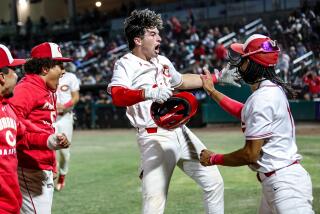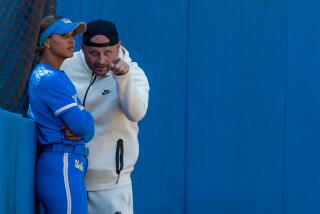Sun Devils Benefit From Torrance Baseball Pipeline : Kevin Higgins, Dave Alexander Took Different Routes to ASU
There’s a long, lonely stretch of two-lane highway between Torrance and Tempe, Ariz. But for Arizona State baseball Coach Jim Brock, there couldn’t be a kinder strip of asphalt in the world.
Two players in particular came to Tempe along that highway, and without them, Brock’s Sun Devils might not be the fourth-ranked team in the nation today.
Relief pitcher Dave Alexander came to Arizona State as a walk-on --by way of North Torrance High School and Harbor College. But now he’s the Sun Devils’ bullpen ace. And he may only be 5-10 and 150 pounds, but he’s leading Arizona State’s staff in wins (11), saves (five) and earned-run average (2.30).
Second baseman Kevin Higgins (Torrance High and Harbor) makes up the other half of the South Bay-to-Tempe connection. An All-American last year, Higgins is hitting .333 with seven home runs this season. He’s a slick infielder, fearless turning the double play, and he’s also one of the toughest hitters in the country to strike out--the last time Higgins saw strike three was March 17 against USC (a span of 19 games and 97 plate appearances).
With Higgins and Alexander, Arizona State is 36-12, and the Sun Devils trail first-place Arizona by only a game in the Pac-10 Southern Division. So all is happy in Tempe.
Higgins and Alexander were teammates at Harbor under Coach Jim O’Brien in 1986. But it looked as if their partnership would end there. They came to Arizona State under different circumstances--Higgins as the prized blue-chip recruit and Alexander as the drifter.
1987 was a long year for Dave Alexander. He sat up in the grandstands that year in Arizona State’s Packard Stadium and watched his roommate, Higgins--then a junior--hit .361 to lead the Sun Devils to a 60-13 record.
And he sat and saw Arizona State win the Pac-10 championship. He watched when Higgins and his teammates went on to the College World Series, where they lost, 9-4, in the final game in Omaha, Neb.
“I’d be watching the team play, knowing that I could be out there contributing,” Alexander said. “It was really tough. Especially knowing all the players.”
Alexander had earned all-Metropolitan Conference honors at Harbor the two previous years. The slender right-hander decided to take his wicked slider to Cal State Los Angeles for the 1987 season, but when he found out he didn’t like it there, he made up his mind to hit the road for Arizona State.
“A lot of people told me I couldn’t just transfer to a nationally ranked team and play,” Alexander said. “They said that walk-ons never really get a chance to prove themselves.”
Alexander showed up in Tempe, walked on, and was rewarded with a spot on Arizona State’s “jayvee squad”--which basically meant that he stayed in class and stayed off the field. He was even ineligible to practice after transferring from Cal State Los Angeles.
“I really wasn’t allowed to do too much at all,” Alexander said.
Alexander lived with his friend Higgins and pitcher Oscar Rivas in a Tempe apartment that they called “The Alamo.” Alexander hung out and went out with baseball players--but wasn’t allowed to throw any pitches until last fall.
That’s when Higgins went to Sun Devil pitching coach Dub Kilgo and reminded him that his roommate was a pretty good pitcher back at Harbor. So Alexander went through walk-on tryouts again.
“At that point, I’d be looking at (Alexander) pitch in practice and I’d be thinking: ‘This guy looks good,’ ” Brock said. “But then I’d think: ‘If he really is that good, how come we don’t know more about him?’ ”
Brock knew a lot more about Alexander after Arizona State’s annual Fall Tournament at Compadre Stadium--the Milwaukee Brewers’ spring training facility in Chandler, Ariz. The ever-patient walk-on finally got a chance to take the mound in the championship game of the tournament with the Sun Devils trailing arch-rival Arizona by a run in the eighth inning.
Alexander made a quick impression. He picked an Arizona baserunner off first and struck out the next batter. Then, after the Sun Devils scraped together a pair of runs in the ninth, Alexander struck out the next three Arizona batters--all of them looking--to get the win.
“I think that opened Coach Brock’s eyes,” Alexander said. “He really hates the University of Arizona.”
Alexander had earned a spot in the bullpen. As a right-hander on a pitching staff dominated by southpaws, Alexander had plenty of opportunities early this spring to prove himself as a situational reliever. Instead, he wound up as Brock’s stopper.
And he’s earned himself a nickname. His teammates call him “The Vulture”--because he’s gotten several of his wins when the Sun Devils rallied to score after Alexander came into with the game tied to keep it close.
“I like coming in, knowing that it’s up to me to get us out of a jam,” Alexander said. “I like to try to get us in there so we can score runs.”
Alexander’s fastball is in the range of 82-83 miles per hour, but his best pitch is his hard slider. Alexander throws it as hard as his fastball, and he’s used it to strike out 44 batters in 54 innings this year.
“He’s been just like a dream,” Brock said. “You always hope that every couple of years you’ll get a walk-on that contributes somehow. But Dave has been something very rare. Especially the extent of his success.”
Alexander has made a believer of his coach. Brock, in 17 years at Arizona State, has seen 125 of his former players go on to professional baseball--39 of them to the major leagues. He thinks Alexander can go the way of the others, even though he’s not 6-4 or cast in the hard-throwing mold that most pro scouts look for.
“Undoubtedly, he’ll get drafted and go into Class-A ball as a short reliever,” Brock said. “But he’ll face the same battle as he faced with us as far as proving himself.”
Brock once said the same sort of thing about Alvin Davis, who was a slow-footed first baseman at Arizona State, but is now a power-hitting star with the Seattle Mariners.
“I said that Alvin isn’t really a good first baseman, that he has no power, and that he can’t run,” Brock said. “So how do you ever know?”
It never was any problem to get Kevin Higgins onto the field at Arizona State. The problem sometimes is finding a way to get him off the field.
Brock remembered one day last fall, after the tournament victory over Arizona, when Higgins came into his office. “He had a real down look on his face,” he said. “He looked really upset, and that’s not like Kevin, so I asked him what was wrong.
“He told me he was down because it was gonna be two months before we’d get to play again.”
Higgins loves to play the game of baseball. Sometimes to the extreme. Higgins recently proposed to Debbie Rutherford--his girlfriend of seven years--in between games at the Riverside Baseball Invitational. He popped the question after Arizona State beat Oregon State, 4-2, to advance to the final against Brigham Young.
“It was no surprise to her or anybody else,” Higgins said. “Baseball’s been my entire life, and for seven years part of hers, so sometimes we joke that we’re going to get married on the baseball field. She’s probably sat through more baseball games than any female alive.”
Higgins loves the game so much that he moved with his father to Torrance from his native Idaho so that he could hone his baseball skills in California--the hotbed of prep talent. He set school records with a .505 batting average and 46 RBIs at Torrance High, then moved on to Harbor, where he earned all-state honors and set school records for hits and RBIs.
At Arizona State, he’s been phenomenal. A line-drive hitter with fence-clearing power, Higgins hit 10 home runs last year en route to being named a first-team All-American by Baseball America magazine.
He was Arizona State’s first All-American at second base since Bob Horner (1978).
“Kevin has the knowledge of the game of baseball of a guy who has played in the big leagues for 10 or 15 years,” Brock said. “He’s got an incredible baseball mind.”
Brock said Higgins and shortstop Anthony Manahan turn the double play as well as any college infield combination in the nation. Higgins’ infield skills have earned him plenty of attention from professional scouts--he was drafted in 1986 by the Detroit Tigers and almost passed up his senior year at Arizona State to sign with Tigers’ scout Rick Arnold.
He’s likely to be drafted again in the upcoming June draft, and he’ll probably go high.
“I’m not worrying about that,” Higgins said. “I’ll just spill my guts 110% on the field and let the scouts worry about where I get drafted. Whether I’m picked first or 800th, I’ve still got to go to the same place to make it to the major leagues.”
The 5-11, 170-pound senior admitted, however, that he put a little too much pressure on himself at the beginning of the season.
“I was trying to do too much,” Higgins said. “We’ve got a young team. I was trying to carry the load a little too much.”
He picked a good time to get hot. Two weeks ago he dismantled Stanford, last year’s College World Series champions, with a 5-for-5 performance on national television, and has raised his Pac-10 batting average to .344.
Brock said he doesn’t doubt that Higgins and Rutherford will get married on the baseball field. “He probably will do that,” he said. “He is absolutely so crazy about playing the game of baseball.”
Higgins already has plans for his baseball future. He and his fiancee will get married in September; then they’ll move to Boise, Ida., where the entire Higgins clan is building houses on an improved lot.
“It’s nice and open there,” he said. “It’s not as congested as the South Bay. In Idaho, you can just walk 100 yards with your fishing pole and pull a trout out of the Boise River. You can just walk up the mountain and go pheasant hunting, or skiing. It’s country.”
Higgins once went with Alexander to a country-Western bar in Tempe called Denim & Diamonds, but the relief pitcher didn’t like it much. But then again, Higgins conceded that there were times during his four-year stay in California when he wasn’t quite in step with the rest of the South Bay.
“I listen to country music,” Higgins said. “I wear boots, a belt with a big buckle, and a hat. It’s tough to do that in Southern California. You’d take a lot of ribbing.”
More to Read
Go beyond the scoreboard
Get the latest on L.A.'s teams in the daily Sports Report newsletter.
You may occasionally receive promotional content from the Los Angeles Times.










